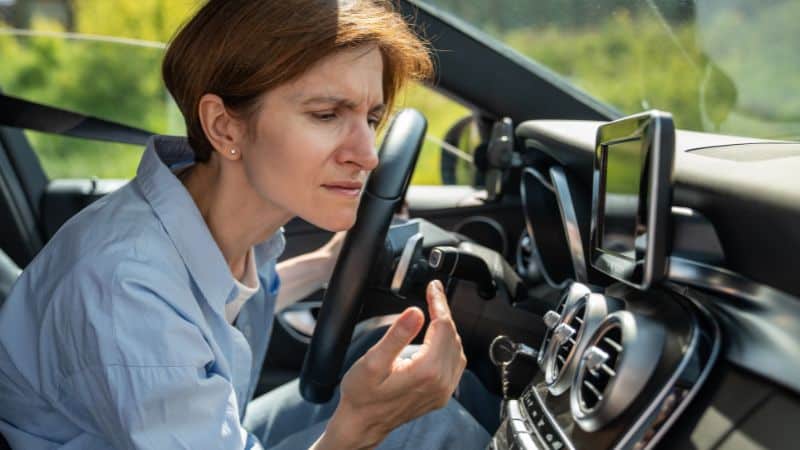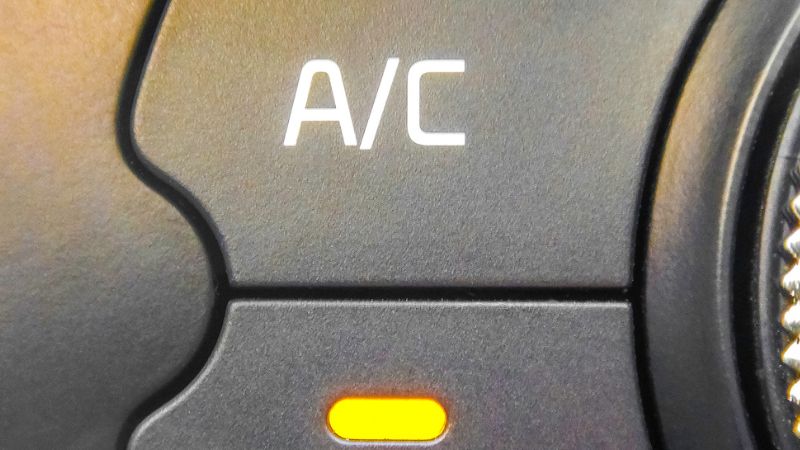An effective air conditioner plays a significant role during warm and humid summers. Especially when you get in your car, and it’s so hot. You turn on your AC, but it still warms. In that situation, you may ask, why does my car’s AC turn off by itself? Of course, if your car AC turns off on its own, it’s frustrating for you.
Actually, there are some possible causes why the car’s AC might turn off on its own. All causes can start from mere annoyances to significant issues. Because of that, you may need a professional to fix the problem. With any luck, this content will help you to find out the problem so that you can fix it by yourself quickly. Let’s begin.

How Long Does Car AC Last?
The functioning of every car air conditioner is different, and it can vary from vehicle to vehicle. A mechanic must investigate the vehicle’s history and speak with the previous owner to establish the vehicle’s age. Lifespan ranges from 8 to 10 years, depending on where you live and whether you service it regularly. Also, your car’s AC may require recharging, which you can do once a year if needed.
Reasons Of Why Does My Car AC Turn Off By Itself?
Adequately, the air conditioning system has different parts. As a result, the entire process will stop at the first sign of a system error. Actually, if you know how AC works, you can answer the question, “why does my car AC turn off by itself while?” Simple. This issue actually has multiple causes. And right now, we will talk about each. Have a look.
Short Cycling
Why does my AC turn off by itself? Well, the most obvious case of turning the car’s AC off by itself is repeated short cycling. Furthermore, the AC compressor keeps running non-stop until the temperature inside your car reaches the thermostat setting. A cycle can last 15 to 20 minutes before the compressor shuts down. Then, it restarts the cycle when the car temperature rises. A premature shutdown of the compressor will shorten the cooling cycle. The following are the leading causes of short cycling:
- Blocked air filter
- Incorrect size air conditioner
- Leaks of refrigerant
- Thermostat malfunction
Compressor Malfunction:
The compressor creates pressure and continuously transfers the refrigerant to operate the AC. Moreover, the system will not have enough cooling power if faulty. Eventually, your car’s AC turns on itself and suddenly shuts off. Likewise, the main cause of a damaged compressor is leaving it idle for too long. The compressor’s components get stuck together and, as a result, cannot work correctly.
Remember to turn on the AC frequently to avoid this problem. Even if you don’t use it, run it for 15 minutes once a week to keep it in good condition. In the interim, you must replace the AC compressor once it turns on and off. Regretfully, replacing the entire AC unit might be necessary if the malfunctioning compressor is due to the metal chip.
Blown Fuse:
Regardless, a blown fuse may be another culprit if your car AC works only if the engine is running. Other parts of your vehicle may stop functioning correctly due to this issue. But how do you know your fuse is blown? Generally, to find out which fuse controls the air conditioning, you must consult your owner’s manual. However, you must seek professional assistance if you cannot do so.
Bad Compressor:
Compressor failures occur occasionally with air conditioners. Not only is it quite cold, but cool air may be seen emerging from the vents. There is also the possibility of compressor noise. Consequently, compressor bearings may wear down or lose lubrication. A grinding or screeching noise will result from this in the compressor. While it is sometimes possible to fix these parts, it is usually preferable to replace the compressor entirely. Even though this is a more costly repair.
Faulty Mixture Door Actuator:
The blend door actuator regulates the vehicle’s temperature control system. When you change the airflow temperature, signals are sent to it. After checking other elements in the AC, if found, no problem; it’s coming from a faulty blend door actuator. If this function isn’t working correctly, your AC may turn on and off without warning. Symptoms of this problem include:
- HVAC controls on the dashboard are making clicking noises.
- Whenever you adjust the temperature of the AC, there is a strange noise.
- When you do not even change the temperature, it suddenly goes from cold to hot.
Leak Of Refrigerant:
Due to the leak in your system, your AC will also leak slowly over time. If this happens, the low-pressure switch will shut down the compressor to protect the other components. When this occurs, the system must be recharged completely. Though it sounds like a hassle, it’s perfect that your AC shuts off before a big problem.
Clogged Expansion Valve or Orifice Tube:
Your AC may have a clogged expansion valve if it runs for a few minutes before shutting off. Nevertheless, it’s the most common cause of your car’s AC shutting off.
Here’s how to determine whether this is the issue:
Moisture in the air causes the windshield to fog when the AC interferes with the defrost mode. Your cabin’s air conditioning and heating system could be better. The engine won’t shut off properly. From your old model car with a clogged orifice tube Generally, it will keep running for a few seconds after turning off, so you will notice this.
Blocked Cabin Air Filter:
A blocked cabin air filter is another common reason your car AC turns off by itself. Basically, a cabin air filter’s job is to keep your car air clean, dust, and more. Ideally, it would help if you replaced your car AC once per year or 15,000 km (9,300 miles). But this may vary depending on the make and model of your vehicle. So if you replace it on time, it will be transparent with debris restricting car air ducts airflow.
When you don’t replace it as often as you should, it gets clogged with debris, restricting airflow in the car’s air ducts. Typically, your climate control system’s overall performance will suffer.
Low Coolant Level:
Coolant, sometimes called antifreeze, is essential to your car’s cooling system. It is intended to shield your engine from freezing and overheating in colder months. For this process to work correctly, your vehicle must have coolant. Every car needs a sensor to detect engine temperature and modify coolant flow accordingly.
However, coolant will not function as well as it should if there is not enough of it. As a result, you may encounter serious issues such as overheating and engine damage. Some apparent indicators of low coolant levels that you may have noticed are as follows:
- The cooling system alert illuminates.
- The temperature gauge exceeds the halfway point.
- Overheating of engines
After noticing these signs, you should call the expert immediately.
Locked Up Compressor:
Finally, there is a chance that your compressor is stuck. The AC system’s heavy and intricate compressor cannot operate if jammed. Ergo, if you suspect this, turn on the air conditioner and see if the compressor clutch engages. In contrast, if it does not engage, you have a broken compressor.
Therefore, this may also cause another issue, depending on the extent of the damage. Your A/C system may have lost all its oil because it ran without lubrication. You should need to add more oil and evacuate any remaining refrigerant. Then, refill with new refrigerant and leak-test it before filling your air conditioning system with oil.
Turning Car AC On And Off While Driving?
Your car’s AC turning on and off repeatedly is a common problem while you are driving. Mainly, it can cause air, failing and damaged components, or mechanical and electrical factors. In particular, your car’s AC power is turning on and off; it sounds like a harness or wiring problem. Sometimes, if the compressor turns on and off, that’s normal. But doing too much may indicate an under- or over-charge, air in the system, or something else. Yet, if it warms up and cools down with no other observations, it could be charge-related or regulation-related.
Even it can depend on many other factors including thermal load and ambient conditions. Without it, the AC shuts off while driving, which can happen due to short cycling. Short cycling is when the AC cooling cycle stops prematurely and restarts after some time. Though short cycling is a standard AC problem, you should need costly repairs if you don’t detect it early.
Why Does Car AC Turns On By Itself?
Does your car AC turn on by itself? Actually, this is a common problem that most people face during summer. AC turns on by itself? The situation is very annoying. Not only is it annoying, but it can put your AC at risk of damage. Air con can enhance fuel consumption, but leaving it off for a long time can cause AC system problems. Some drivers may change their car AC every two or three months, but it won’t work as well as it should. That’s why always using your car’s AC system is best.
Turning the AC on/off itself may be part of the auto setting of your vehicle’s ventilation system. AC can turn on automatically when you set the fan to demist the front screen. In rare cases, it’s a fault with the air con. But not to worry if the AC doesn’t work when the fan is turned off. There are more reasons why the car’s AC turns on by itself. Have a look:
- Your air filter must be changed.
- Your vehicle needs a tune-up.
- Low refrigerant levels and
- A blown fuse
How Do You Fix a Car AC Turn Off By Itself?
Why does my car AC turn off by itself after? As you can see, there are many causes, so you should first check them out. After checking for an easy fix, you can do it yourself. Generally, it’s good to check your car’s refrigerant and coolant levels. Both levels are low, so they are the culprit stopping AC from working entirely.
Then, check the compressor. Indeed, if you didn’t do it before, you should call a professional mechanic to diagnose the problem. Similarly, if you have a cabin air filter or expansion valve, consult a trained technician to fix the problem.
FAQ (Frequently Asked Questions)
Q. Why is AC in my car blowing air and then stopping randomly?
Your AC blowing air and stopping randomly means a problem with your AC system. Several potential causes exist, such as low refrigerant levels and dirty filters. Here are the five common causes of your car’s air blowing and stopping randomly.
- Dirty filters
- Low refrigerant levels
- Loose hose connections
- Fauktu car Ac compressor
Q. Why is my AC compressor turning on and off in my car?
Low refrigerant is most likely the source of the problem. The system has a pressure switch that prevents the compressor from coming on if the system is out of refrigerant. As the system leaks, there is a period when the system will turn on and off rapidly.
This results from the pressure drop in the downstream side of the system during compressor operation. The pressure drops below the switch’s threshold, and the compressor shuts down. After stopping the compressor, the pressure is increased, and it is allowed to restart. The cycle is repeated until the system’s refrigerant levels are so low that it will not start at all.
Final Word:
To conclude, why does my car AC turn off by itself? Clogged, dirty air filters restrict airflow and can cause overheating and automatic shutdown of air conditioning. Clean or replace the air filter according to the manufacturer’s recommendations. Usually, you should do it every 90 days or more often if you have pets. Sometimes, this easy maintenance procedure can resolve unplanned shutdowns.
On the other hand, after noticing any causes, don’t delay. It’s best to consult a professional or try to fix it immediately by yourself. Finally, here we have described the most common causes of AC turn-off by itself. After reading the full article, we hope you can diagnose and fix the problem easily.


